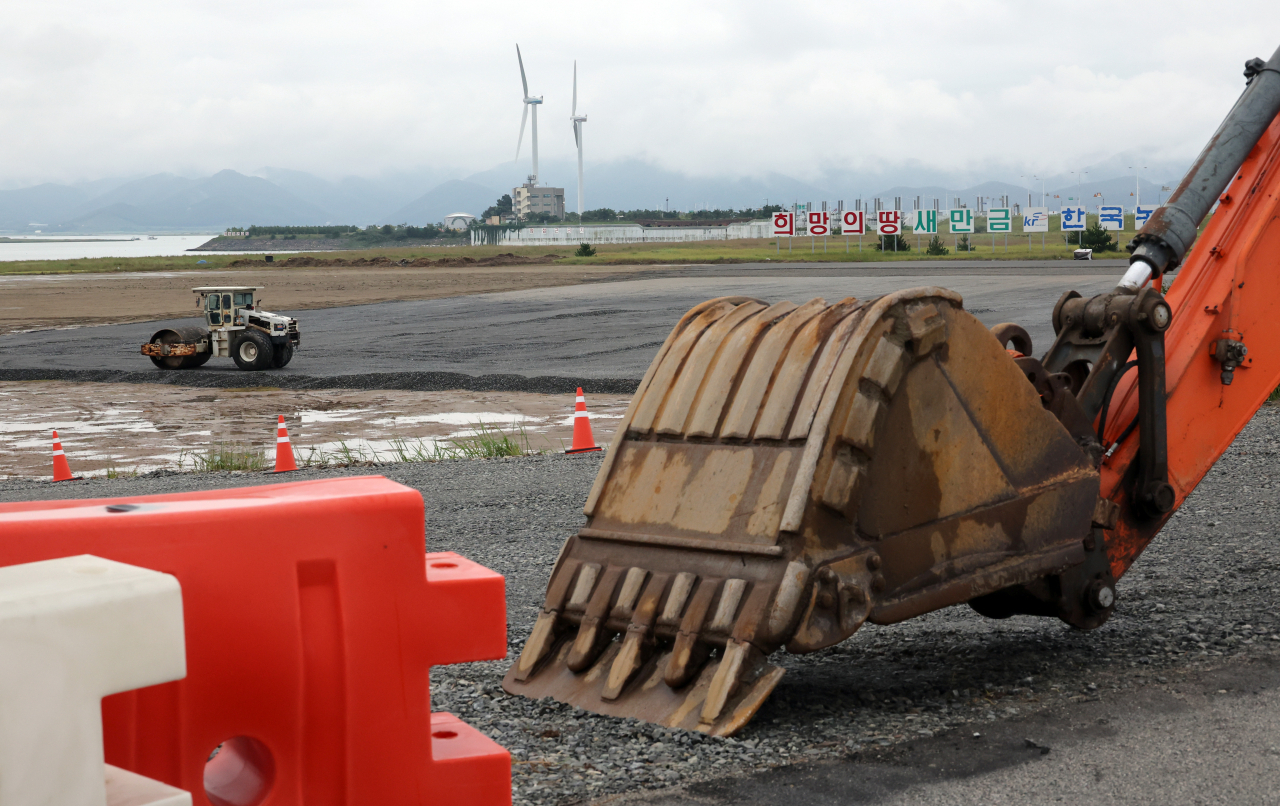S. Korea hits reset on Saemangeum basic plan after Jamboree debacle
By Son Ji-hyoungPublished : Aug. 30, 2023 - 15:37

Proposals to develop the Saemangeum, a reclaimed tidal flat area in North Jeolla Province, have been sent back to the drawing board after the projects' budget for next year has shrunk by nearly 80 percent compared to this year.
Plans by 2030 to build an airport, a sea port and highways, among other infrastructure facilities, as part of the basic plan running through 2050 on the site, which is two-thirds the size of Seoul, are to be "completely overhauled," officials said.
It came less than a month after the World Scout Jamboree in the Saemangeum devolved into a disaster, forcing some 43,000 scouts to relocate due to a heat wave, hygiene and drainage problems, failure to control insects, shortages of food and drinking water, as well as incoming Typhoon Khanun.
The decision drew criticism that the government is trying to make North Jeolla Province a scapegoat for the botched jamboree.
Rep. Park Kwang-on, floor leader of the main opposition Democratic Party of Korea, blasted the conservative Yoon Suk Yeol administration over the slashed budget in a meeting with the party's supreme council members in Muan-gun, South Jeolla Province, Wednesday.
Park added that the Yoon administration is essentially "blaming North Jeolla Province for the botched Jamboree operations and, furthermore, taking it out on North Jeolla Province."
Also on Wednesday, Yeom Young-sun, spokesperson for the Jeollabuk-do Provincial Assembly, called the decision to cut the budget for the Saemangeum a "political conspiracy."
"The Jeollabuk-do Provincial Assembly is strongly urging (the politicians) to stop the abuse of political power attacking North Jeolla Province and (the government) to scrap the current budget plan," Yeom said, adding the council could take action to protest the decision with residents.
He added that the discontinuation of the infrastructure development project in the Saemangeum translates into Yoon's failure to keep his promise during the presidential election campaign. Yoon was inaugurated in May 2022.
"The unprecedented reduction of the budget after the Jamboree debacle is a form of violence that cannot be taken reasonably," Yeom said.
The Saemangeum development kicked off during the former Roh Tae-woo administration in 1990, initially with the aim of turning the partially offshore tidal flats into farmland. Then, during former President Roh Moo-hyun's term, a special law enabling 30 percent of the reclaimed land to be designated for industrial use was passed and signed. The former Lee Myung-bak administration later proposed plans to use 70 percent of the reclaimed land for nonagricultural purposes in 2008, keeping 30 percent for agriculture, finalizing them in 2010.
Under the current basic plan unveiled in 2021, the Saemangeum was to have transport infrastructure such as a commercial airport, sea port and roads ready through a 10-year initiative ending in 2030, and ultimately attract at least 270,000 residents to the reclaimed site with the aim of hosting manufacturing companies, creating an agricultural tech hub and building tourist attractions by 2050.
But the Finance Ministry's 2024 budget plan indicated Tuesday that next year's budget allocation for infrastructure projects has been reduced to 147.9 billion won ($111.8 million) -- down 78 percent from 662.6 billion won in 2023.
Specifically, next year's budget for the construction of the airport -- which had been scheduled to start in 2024 -- was reduced by 90 percent to 6.6 billion won at the Finance Ministry from the initial budget proposal of 58 billion won. North Jeolla Province operates an existing airport in the city of Gunsan.
Budget plans next year to build a railroad connecting the new Saemangeum sea port and the city of Gunsan, an arterial road and ecological zones were completely scrapped, which would otherwise have cost the country a combined nearly 20 billion won.
Finance Minister Choo Kyung-ho Wednesday told the National Assembly he does not "intend to oppose the Saemangeum's development" and downplayed concerns that the budget cut was a retaliatory action for the failed Jamboree.
Meanwhile, Prime Minister Han Duck-soo also told the National Assembly that without the improvisation of nationwide effort to salvage the bungled Saemangeum Jamboree, the event "would have been unable to get proper evaluation." Han also told the parliament that the review of the plan will center on ways to invite more decent companies to the Saemangeum industrial complex and ways to draw more attention from tourists from countries like China.
This came after the Land Ministry announced Tuesday plans to create a special team dedicated to inspecting the infrastructure development projects in the Saemangeum. It also pledged to consult the private sector to review the feasibility of the project.
The government "will objectively inspect the overall infrastructure projects that have been implemented in the name of infrastructure improvement in the Saemangeum, such as the construction of an airport and railways, in order to dispel public distrust over the projects," the Land Ministry said in a statement Tuesday.
According to the provincial government data compiled by Rep. Song Eon-seog, a lawmaker of the ruling People Power Party, the government has spent about 11 trillion won on infrastructure improvement projects.
Authorities have injected some 3.2 trillion won into the construction of a new port in the Saemangeum, 1.9 trillion won into a new highway connecting Saemangeum and the city of Jeonju, North Jeolla Province, and 1.3 trillion won into the train connecting the Saemangeum and Gunsan.
The government data indicated that the Saemangeum industrial complexes have drawn 6.6 trillion won of corporate investment over about a year from May 2022 until end-June, up more than fourfold from the 1.5 trillion won investment during the period spanning through the previous nine years.



















